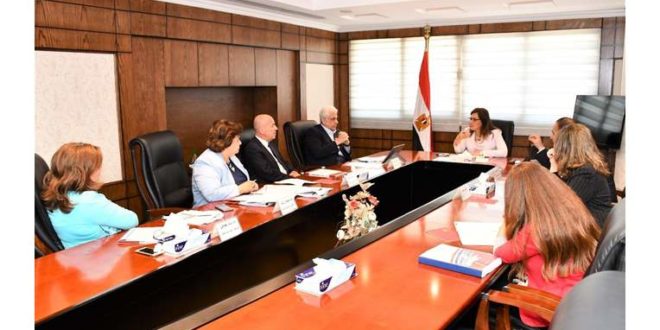Today, Dr. Hala Al-Saeed, Minister of Planning, Follow-up and Administrative Reform, received a delegation from the National Competitiveness Council headed by Prof. Dr.. Hossam Badrawi, honorary president of the Council and a. Saif Fahmy, Chairman of the Council and a number of its leaders, to discuss competition between governorates and cooperation between the Ministry and the National Competitiveness Council
The Minister of Planning indicated the need to apply decentralization to the development of the governorates, which would achieve competitiveness among the different governorates, adding that resources are distributed to the governorates based on the development gaps that exist in each governorate, and this was taken into account in the 18/2019 plan, in order to achieve sustainability and push more investments in provinces.
Hala Al-Saeed also welcomed the cooperation between the Ministry of Planning and the Egyptian National Competitiveness Council in order to obtain a positive result and the possibility of measuring the competitiveness of the governorates, stressing the need to define sustainable development goals at the governorate level.
Entrepreneurship was also discussed during the meeting, and the minister stressed the need to raise a generation with a culture of entrepreneurship by educating young people in schools and universities.
For his part, Dr. Hossam Badrawi, Chairman of the Egyptian National Competitiveness Council, pointed to the importance of the governorates’ competitiveness, noting the meetings that took place with the governorates, the Ministry of Local Development, the Central Agency for Public Mobilization and Statistics, and the Cabinet Information Center, with the aim of emphasizing the need for civil society to participate in the government in issuing annual reports. On the competitiveness of the governorates in order to achieve a kind of credibility for those reports, stressing that the issuance of these reports leads to raising the competitiveness of the governorates and raising the efficiency of their work.
At the end of the meeting, the two parties agreed on the possibility of concluding a cooperation protocol between the Ministry of Planning and the Egyptian National Competitiveness Council, provided that the ministry would build competitiveness indicators and the stages of their implementation in cooperation with the Council, with a community dialogue being held in the presence of the concerned ministers and representatives of civil society.

 Dr. Hossam Badrawi Official Website
Dr. Hossam Badrawi Official Website

